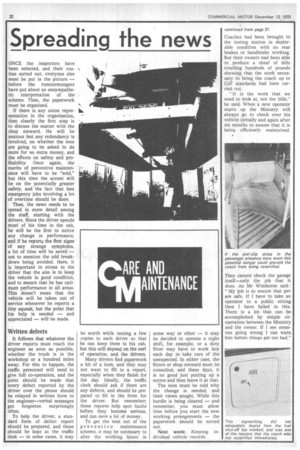Spreading the news
Page 26

If you've noticed an error in this article please click here to report it so we can fix it.
ONCE the inspectors have been selected, and their routine sorted out, everyone else must be put in the picture — before the rumourmongers have put about an unsympathetic interpretation of the scheme. Then, the paperwork must be organised.
If there is any union representation in the organisation, then clearly the first step is to discuss the matter with the shop steward. He will be anxious lest any redundancy is involved, on whether the men are going to be asked to do more for no extra money, and the effects on safety and profitability. Once again, the merits of preventive maintenance will have to be "sold," but this time the accent will be on the potentially greater safety, and the fact that less emergency jobs involving a lot of overtime should be done.
Then, the news needs to be spread in more detail among the staff, starting with the drivers. Since the driver spends most of his time in the cab, he will be the first to notice any change in performance, and if he reports the first signs of any strange symptoms, a lot of time will be saved — not to mention the odd breakdown being avoided. Here, it is important to stress to the driver that the aim is to keep the vehicle in good condition, and to ensure that he has optimum performance in all areas. This doesn't mean that the vehicle will be taken out of service whenever he reports a tiny squeak, but the point that his help is needed — and appreciated — will be made.
Written defects
It follows that whatever the driver reports must reach the engineer as soon as possible, whether the truck is in the workshop or a hundred miles away. For this to happen, the traffic personnel will need to give full co-operation, and the point should be made that every defect reported by the driver over the phone should be relayed in written form to the engineer—verbal messages get forgotten surprisingly often.
To help the driver, a standard form of defect report should be prepared, and these should be kept at the traffic desk — in some cases, it may be worth while issuing a few copies to each driver so that he can keep them in his cab, but this will depend on the sort of operation, and the drivers.
Many drivers find paperwork a bit of a bore, and they may not want to fill in a report, especially when they finish for the day. Ideally, the traffic clerk should ask if there are any defects, and should be prepared to fill in the form for the driver. But remember; these reports help spot faults before they become serious, and can save a lot of money.
To get the best out of the preventive maintenance scheme, it may be necessary to alter the working hours in some way or other — it may be decided to operate a night shift, for example, or a duty fitter may have to work late each day to take care of the unexpected. In either case, the fitters or shop steward must be consulted, and these days, it is no good just putting up a notice and then leave it at that.
The men must be told why the change is needed, and their views sought. While this hurdle is being cleared — and remember, you must allow time before you start the new working arrangements — the paperwork should be sorted out.
Next week: Keeping individual vehicle records.














































































